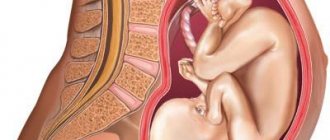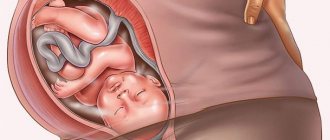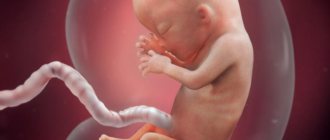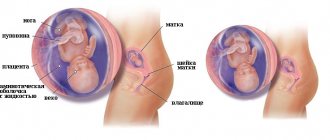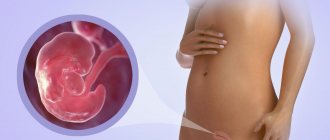Fetal development at 29 weeks of gestation
At this time, the child continues to actively prepare for birth. His own immune system starts working. Thermoregulation processes are being honed.
- At this time, the baby’s blood has a constant composition. The bone marrow fully copes with its functions.
- The digestive system will already be able to digest breast milk.
- The kidneys are actively working. Every day they distill 500 ml of water, which is discharged into the amniotic fluid.
- The baby continues to swallow amniotic fluid, but now it enters the stomach not only through the mouth, but also through the nasal passages. The plugs that previously blocked them have dissolved.
- The baby is already able to distinguish smells. It actively responds to light and sound.
- The child learns to focus his gaze.
- The appearance of the fetus continues to undergo significant changes. His skin gradually becomes smoother, the original lubricant and fuzz disappear. Just a little more and the baby’s first fat folds will begin to appear.
- The genitals continue to develop, but at the same time they are already practically formed.
- All the baby’s teeth are still inside the gums, but at this stage they begin to be covered with enamel.
- Internal organs begin to work in the system. The child's heart beats loudly enough that it can be heard without any problems using a phonendoscope.
- Every day the child increases his weight and height. Its body weight is about 1200 g, and its height is approximately 38 cm.
- The baby's muscles and ligaments become stronger, which makes the child stronger. It is for this reason that he can push quite noticeably from the inside.
There is not enough room in the stomach to make active movements, so the baby will no longer be able to perform full somersaults.
Feelings at 29 weeks of pregnancy
Many women note that starting from the 29th week of pregnancy, changes occur in the nature of movements. They become stronger and therefore are felt more clearly. In addition, the child begins to kick more, but roll over less. All this is understandable, because there is very little space left inside.
As the uterus grows, it begins to put pressure on the internal organs. This leads to constipation, bloating, belching, and heartburn. At the same time, a woman may experience breathing problems for the first time, as the uterus begins to support the diaphragm. Therefore, you should not be surprised by slight shortness of breath and lack of air, especially when performing active movements.
Many women note that they periodically experience a feeling of heat or flushes of warmth throughout their body. This is due to the fact that the load on the heart has increased significantly, and metabolism has also accelerated. Therefore, sweating becomes more intense. To avoid unpleasant odors, you should shower more often.
A woman becomes more and more clumsy every day, so she needs to be especially careful. It is necessary to avoid sudden rises from a place, turns and other movements. A displaced center of gravity can make itself felt even when performing the most common actions.
Dizziness is often observed at the 29th week of pregnancy, and sometimes fainting can even occur. This is often associated with a drop in blood pressure and iron deficiency anemia.
It is possible that the usual postures for resting at night may now seem uncomfortable. To avoid discomfort, you can use special sleeping pillows. This will make it deeper and more complete.
The woman begins to get more and more tired, so you need to try to make time for yourself during the day. If this is not possible, then you just need to take short breaks, during which you should put your feet on some height, take foot baths, and do a massage. You should not spend a lot of time sitting or standing, and you should not walk a lot. It is imperative to involve family and friends in household chores. If your health suddenly worsens and rest does not help normalize it, you should visit a doctor or call a doctor to your home.
Prohibitions and recommendations at 29 weeks of gestation
Starting next week, the expectant mother will go on maternity leave, so in the last week you need to think about what she will do in the last months of pregnancy. It is advisable to enroll in special courses where a pregnant woman will be taught how to handle a child and behave during childbirth. Free time can be devoted to buying children's things and arranging the house.
Nutritional Features
The diet of the expectant mother at any stage should remain complete and balanced. It is necessary to control the amount of energy value of foods and basic nutrients. Also, a pregnant woman should consider several points:
- A child needs 250-300 mg of calcium per day, so a woman should receive a sufficient amount of this substance;
- To build the baby’s muscles and organs, a lot of protein is required, so the expectant mother is recommended to consume baked, boiled meat and fish, legumes, and dairy products;
- Many women experience constipation. To improve intestinal motility and normalize digestive function, you need to monitor the amount of fiber consumed. To do this, you should add fruits, vegetables and a variety of cereals to your diet.
It is better to exclude dishes rich in artificial dyes and too high in calories from the menu. You should also limit your consumption of condiments. Many of them are characterized by abortifacient properties.
Taking vitamins
Even if you follow the right diet, it is quite difficult to ensure that the body receives the necessary substances. To compensate for the deficiency of missing microelements, many pregnant women are advised to take additional multivitamin complexes. It is also recommended to take vitamin D and calcium. For anemia, folic acid and iron supplements are prescribed.
Sex at 29 weeks pregnant
If the woman is feeling normal and there are no pregnancy pathologies, intimate relationships are not contraindicated. However, some care should be taken to avoid deep penetration and pressure on the abdomen.
Sexual contact is prohibited in case of multiple pregnancy, placenta previa, isthmic-cervical insufficiency, leakage of amniotic fluid and other pathologies that the doctor warns about.
Physical activity
The activity of the expectant mother in labor needs to be slightly reduced. You cannot walk or stand for a long time. Jumping and running are prohibited. The expectant mother is allowed to take leisurely walks and perform specially designed exercises. You can also do breathing exercises and visit the pool. Kegel exercises, which train the pelvic muscles, will be useful. This will help prevent urinary incontinence in the last weeks and speed up your recovery after delivery.
Medical procedures, taking medications
During the period of gestation, the expectant mother should avoid any medical interventions. Medications are prescribed only if there are special indications. In the third trimester, it is possible to use local drugs, anti-inflammatory and antihistamine drugs. If necessary, medications are prescribed to normalize blood pressure and blood flow. The choice of the drug and its dosage is determined by the obstetrician-gynecologist, taking into account the characteristics of pregnancy and the condition of the pregnant woman.
Causes of pain
As the pregnancy progresses, the discomfort that previously bothered the woman may turn into pain. This is not surprising, because every week the weight continues to increase. This puts additional stress on the lower limbs, on the back, on the lower back, on the spinal column, on the sacral region. A prenatal bandage helps remove it. In addition, it allows you to maintain posture and alleviate a person’s condition.
Often the legs of pregnant women hurt not only from the increased load on them, but also from a lack of calcium in the body.
The cause of headaches may be low blood pressure or a long break between meals. Iron deficiency anemia can also lead to headaches.
A woman should listen carefully to her feelings, because they can say a lot. Thus, back pain can be a physiological phenomenon, but if it occurs against the background of painful urination, then this may already indicate genitourinary diseases.
Pain in the anal area most often indicates inflamed hemorrhoids. This condition cannot be ignored. Hemorrhoids need to be treated immediately, especially since in the initial stages it is not at all difficult to do.
At 29 weeks of pregnancy, the pelvic bones continue to slowly diverge, thus preparing the body for the upcoming birth. Naturally, this will cause discomfort in the pelvic area. But there should not be severe pain.
If noticeable pain appears in the pubic area and perineum, and your gait has become like a “duck’s,” you need to report this to your doctor. It is possible that the woman develops symphysitis.
Of course, what worries a woman most is pain in the abdominal area. It is possible that they are caused by banal indigestion or too intense movements of the baby. However, you should be wary if the pain is sharp, occurs in the lower abdomen and tends to intensify. In this case, it is necessary to urgently call an ambulance. Moreover, you should not hesitate if bloody discharge appears or if your body temperature rises.
Fetal development
The 29th week of pregnancy is marked by a fairly large number of qualitative changes in the child’s body. His internal organs are already quite well formed and almost ready for autonomous existence.
The most important changes in the fetal body are:
- The ability to clearly distinguish the voices of mother, father and strangers.
- The baby's skin continues to develop. He already looks almost like a newborn.
- Lanugo (fluff) and vernix lubrication begin to disappear on the surface of the body. The child is gradually preparing to meet the big world.
- The skin becomes sensitive in all parts of the body.
- The lungs continue to actively develop. The baby is ready to take his first breath.
- The adrenal glands diligently form the child’s hormonal background. Androgens begin to be synthesized in the reticular zone of the cortex of these structures.
- The liver takes on the appearance of a mature organ. Characteristic lobules are formed. Hepatocytes line up in even rows. The liver is increasingly taking on the function of a “chemical laboratory” for the whole body.
- The pancreas already supplies the entire body with the required amount of insulin.
- The baby’s own mechanisms for maintaining the baby’s body temperature begin to work.
At 29 weeks of pregnancy, the baby’s height can reach 37 cm and weigh 1100-1250 g.
What happens to the stomach
The belly continues to increase in size as the baby grows and develops. The skin on the abdomen becomes increasingly tight, which can lead to feelings of dryness and itching. To reduce discomfort, you need to moisturize it regularly. To do this, you can use regular cream, or a special gel or milk. Various oils help to cope with dry skin.
Sometimes itching in the abdominal area is caused by completely different reasons that are not related to pregnancy. For example, the skin may itch due to exposure to an allergen (washing powder, food, cosmetics, etc.). In this case, you should try to independently determine the cause of the allergic reaction and try to get rid of the irritant. If this is not possible, you must contact specialists.
Sometimes women watch with surprise the rhythmic twitching of the abdomen. Do not be alarmed, they occur due to the fact that the child hiccups. As a rule, hiccups do not last long.
From time to time, a woman may feel mild pain in the abdominal area, similar to contractions. In this way, the uterus is prepared for the upcoming birth, and the contractions themselves are training. All you have to do is lie down on your side and rest, after which everything will pass.
What kind of discharge can be considered normal?
You are now in the twenty-ninth week of pregnancy, and moderate light milky discharge of uniform consistency with a slightly sour odor is considered normal for this period.
Yellowish, watery and thin discharge indicates leakage of amniotic fluid. Even slight leakage requires immediate consultation with a doctor, because such a picture indicates damage to the membranes, which can cause intrauterine infection of the child.
Bloody vaginal discharge may be a symptom of placental abruption, or placental previa. By the way, bleeding in these cases can be both external and internal. With internal bleeding, severe pain appears in the abdominal area. You should rush to the doctor and tell him about these symptoms.
Bloody vaginal discharge accompanied by cramping pain in the abdominal area may also indicate the onset of premature labor. In any case, the appearance of such discharge requires immediate medical attention!
Changes in the color of the discharge, the appearance of clots of pus, flakes, foam, and an unpleasant odor in it indicate the addition of a genital infectious disease, which is also accompanied by burning and itching in the genital area. Urgently rush to see a doctor, who will identify the causative agent of the infection and prescribe a course of mandatory therapy. Only treatment of the disease will help in this case to avoid the risk of intrauterine infection of the baby.
Discharge at 29 weeks of pregnancy
Discharge at the 29th week of pregnancy should not differ from the discharge that is always present in a woman. This means that they should be milky or whitish in color, normal, and free of mucus, foam and other inclusions. The discharge should be odorless or have a slightly sour odor. Any deviations from this norm should alert the woman.
- The appearance of liquid, colorless discharge with a sweetish odor indicates water leakage. They can be released in small portions or poured out en masse. In this case, you should not hesitate to contact a doctor; you must immediately seek qualified medical help. Moreover, the simultaneous rupture of amniotic fluid is a sign that labor will soon begin, and their portion leakage indicates thinning of the placenta. In any case, the woman needs hospitalization.
- The appearance of cheesy lumps or mucus in the discharge, or a change in their color to yellow, green or gray, indicates the addition of an infection. You need to get rid of it as quickly as possible.
- If there is blood in the discharge, then you need to call an ambulance. Most likely, the woman has a placental abruption, or there is a threat of premature birth.
- It is important to understand that the source of bloody discharge can be hemorrhoids or anal fissures. Of course, they require special treatment, but it is not emergency.
Often during this period, a woman discovers smudges on her bra. This is the first colostrum. You cannot try to squeeze it out, you can only wipe it or blot it.
Doctors strongly recommend that women at such a late stage of pregnancy not change sexual partners in order to minimize all possible risks of infection.
What happens to mom at 29 weeks?
At 29-30 weeks of pregnancy, it is very important to control your weight. It is necessary to carefully follow all doctor’s recommendations and adhere to the established daily routine. Don't overeat. Excess weight will not benefit either the woman or her baby. Nature itself knows what weight a child should be born with. This is determined at the genetic level, taking into account the constitution of the mother and the size of her pelvis. You should not interfere with this process and eat “for two” or abuse multivitamin complexes.
The normal weight at week 29 is + 10 kg to the pre-pregnancy weight. This increase is considered normal. If a woman is rapidly gaining weight, then it is necessary to review her diet and menu with her doctor. For pregnant women with twins, weight gain may be 1-1.5 kg more.
The uterus continues to grow and rise to the top. By this time, it is already located 9 cm above the navel. The belly continues to grow and the skin continues to stretch. Why a woman may feel a slight itching on the surface of the abdomen and mild pain in the navel.
By the 29th week of pregnancy, a woman has already become accustomed to all the sensations of the third trimester: fatigue and pain in the legs, heartburn, constipation, shortness of breath, sluggishness. Less common symptoms include swelling, nausea, leg cramps, and the development of varicose veins. All of the above sensations are familiar to almost every pregnant woman to one degree or another.
With proper nutrition, following a daily routine, avoiding heavy physical activity and performing special exercises for pregnant women, all these sensations can be minimized, which will allow you to enjoy your pregnancy and feel at ease right up until the birth.
Intimate life
Sex and 29 weeks of pregnancy are completely compatible concepts, provided that there are no contraindications. However, it is still necessary to observe a number of precautions. For example, you need to avoid putting pressure on the abdomen, avoid uncomfortable positions, do not make too sudden movements, and avoid deep penetration. The optimal position is when the man is behind the woman.
Otherwise, there are no obstacles to intimacy. Moreover, thanks to sex, a woman’s mood improves and emotional stress goes away. If any doubts remain, you should consult a doctor about this.
What tests should you take at 29 weeks?
At 29 weeks of pregnancy, a woman will need to donate blood and urine for a general analysis. You will have to visit the doctor more often - once every 14 days. During the appointment, the doctor measures the abdominal circumference, the height of the uterine fundus, and blood pressure. It is important to find out whether the woman has signs of iron deficiency anemia; if there are any, then additional blood is taken for a clinical analysis, which will be used to assess the level of hemoglobin in the blood. A woman's urine should be clean and free of protein.
If there are indications, the doctor prescribes additional tests, for example, takes blood for sugar, hCG, progesterone, etc. When the pregnancy proceeds well, the doctor limits himself to standard prescriptions.
It is worth preparing for the fact that next week you will need to visit the ophthalmologist, cardiologist and therapist again. The gynecologist will definitely take a smear and culture for microbiological examination. It is possible that he will do this at 29 weeks of pregnancy. In addition, at the appointment, the doctor may give a recommendation regarding counting fetal movements. This will once again make sure that the child feels well.
Maternal nutrition at 29 weeks
As throughout the entire period of bearing a baby, the mother should receive a sufficient amount of proteins and fats, vitamins, microelements and minerals. But the food must be very balanced so as not to cause excess weight gain and fluid retention in the body. In the third trimester, you should monitor your diet especially carefully. Weight gain should no longer exceed 300 g per week, otherwise the doctor will insist on following a strict diet and limiting fluid intake. If the situation does not change before the next consultation, you will be hospitalized with a special diet.
Try to give up fatty, fried and sweet foods. Remove salt from your diet as much as possible, as it leads to fluid retention in the body. You can consume no more than 1.5 liters of fluid per day, including soups and juicy fruits. Monitor for swelling. They are easy to see on your feet: after a walk, deep indentations form in place of the elastic band of your socks. Remember that swelling can also spread to internal organs, which is why doctors so often require a urine test. In this way, it is possible to detect early gestosis in time, which can lead to the death of mother and child.
Is it necessary to undergo an ultrasound at 29 weeks of pregnancy?
As a rule, ultrasound is not prescribed at this time. A doctor can send a woman for an ultrasound examination only if she suspects any problems with the health of the mother or the unborn newborn. The most common indication for ultrasound is the risk of premature birth. It is possible that the doctor will recommend that the woman have a pessary, for which it is necessary to know such a parameter as the length of the cervix.
An ultrasound performed at the 29th week of pregnancy will make it possible to determine the sex of the child with a high degree of probability. In addition, parameters such as the work of his heart, his physical activity, etc. will be available for study. Normally, the baby’s heart rate is 130-140 beats per minute.
Symptoms and individual experiences
The 29th week of pregnancy is characterized by the active growth of the baby in the womb. The uterus increases in size and continues to put pressure on all internal organs. Sometimes it's hard to move, laugh or even breathe.
Other characteristic signs of pregnancy at 29 weeks:
- Increased appetite. Women often report outbreaks of hunger that are almost impossible to suppress. In such cases, it is better to eat fruits or vegetables to prevent sudden weight gain.
- Constipation progresses and urination becomes more frequent.
- Nipples get bigger. Secretion of a small amount of colostrum may be observed.
- The baby's movements are no longer so sweeping. Due to the decrease in free space in the uterus, but maintaining the same desire to tumble, the child can push the mother quite strongly from the inside.
- Sometimes episodes of urinary incontinence occur with sudden laughter or sneezing. To prevent such situations, you should use Kegel exercises.
Confusion, drowsiness and minor mood swings continue to haunt most women at 29 weeks of pregnancy.
Nutrition
The course of her pregnancy and the health of the child depend on how well a woman’s diet is structured. Every day, the baby’s body requires a lot of calcium (about 250 mg). Moreover, the fetus will definitely “take” it, if not from the incoming food, then from the internal reserves of the woman herself. Therefore, they must be replenished. The calcium that is best absorbed is the one that enters the body not in the form of artificial supplements, but with food, and with food of plant origin. Otherwise, this may lead to premature ossification of the skull, which will cause certain problems during childbirth.
It is imperative that a woman’s body receives enough protein, since the child needs it to gain its own muscle mass. If for some reason the expectant mother denies herself meat dishes, then she should receive calcium from plant foods.
A properly structured diet will help you avoid digestive problems, and sufficient fiber intake will make it possible to prevent the development of constipation and hemorrhoids. The maximum amount of fiber is found in vegetables and fruits, so they should be present on the table every day.
Do not overload your stomach by eating too large portions. It is best to completely remove fried foods from your menu. The same goes for salt – it needs to be limited. In this way, the risk of edema will be minimized.
It is interesting that previously women were completely recommended to adhere to a lenten menu, starting from the third trimester of pregnancy. At this point in time, this is not practiced, however, the total calorie content of servings should be reduced by limiting flour dishes, smoked foods, and confectionery products.
Do not forget about sufficient intake of iron into the body. Beetroot, spinach, oatmeal, buckwheat, tongue, and liver can replenish its reserves. Contrary to popular belief, chocolate does not help with anemia, but it can add extra pounds.
Can labor begin at 29 weeks of pregnancy?
Childbirth that occurs at 29 weeks of pregnancy will be considered premature, since there are still 3 months left before it. However, if they start, then you should calm down and immediately call an ambulance. Sometimes labor can be induced artificially if there are indications for it.
A baby at this stage is born prematurely and requires connection to special equipment. However, the fetus is already quite viable, and thanks to the qualified assistance of doctors, the child will continue to grow and develop normally. Although the lungs are not yet fully formed, the bronchioles and alveolar apparatus are already quite developed. Surfactant began to appear in them, which will allow the lungs to expand during inhalation.
Changes in the mother's body
What happens to a woman’s body at 29 weeks of pregnancy? Most changes are associated with a gradual increase in the size of the baby and uterus.
The most important events in the 29th week of pregnancy:
- Significant increase in circulating blood volume. Under normal conditions, the body might not be able to cope with such a load on the cardiovascular system. However, during pregnancy, it compensatoryly reduces blood pressure to ensure the woman’s well-being and the adequacy of all metabolic processes.
- The body weight of the expectant mother increases.
- Due to the growth of the tummy, stretch marks often appear on the skin. They occur due to low elasticity of the skin. To prevent this situation, you can use special moisturizing creams.
Heartburn, constipation and flatulence already become almost daily companions for pregnant women when the third trimester is on the calendar. The active growth of the child will only contribute to the progression of unpleasant symptoms.
What can happen at 29 weeks?
- The woman begins to go to the toilet more often to empty her bladder. This is due to increased pressure on him.
- As the uterus continues to grow, it may begin to put pressure on the diaphragm. Therefore, sometimes a woman has breathing problems.
- At this time, a new cause of miscarriage may arise - this is the immune incompatibility of the parents.
- The risk of injury to a woman increases, which is due to a shift in the usual center of gravity.
- A dangerous signal is bloody discharge from the vagina. In this case, you need to immediately call an ambulance.
Adviсe
- Rest should be complete.
- You should not refuse to take vitamins if your doctor prescribes them.
- It is important to monitor your weight gain daily. If the increase is more than 350 g per week, then you should start to worry.
- To minimize the risk of injury, as well as to ease the load on your feet, you should avoid wearing high-heeled shoes.
- Whenever possible, you should do simple exercises. They will strengthen the muscles and prepare them for the upcoming birth.
- During rest, you should try not to lie on your back. This way the vena cava will not be pinched, which will allow the child to receive enough oxygen.
- To prevent sagging of the abdomen, doctors recommend wearing a special prenatal bandage. It also helps relieve stress on the lower back and prevent the appearance of stretch marks.
- If possible, you should definitely visit the pool. During swimming, all muscles are strengthened, while the back does not experience stress.
- Elimination of any digestive problems should be timely. This applies to constipation, heartburn, and hemorrhoids. But self-medication during pregnancy is not acceptable.
- When your baby kicks too hard, you can try to change his body position. It is possible that this will help calm the brawler.



